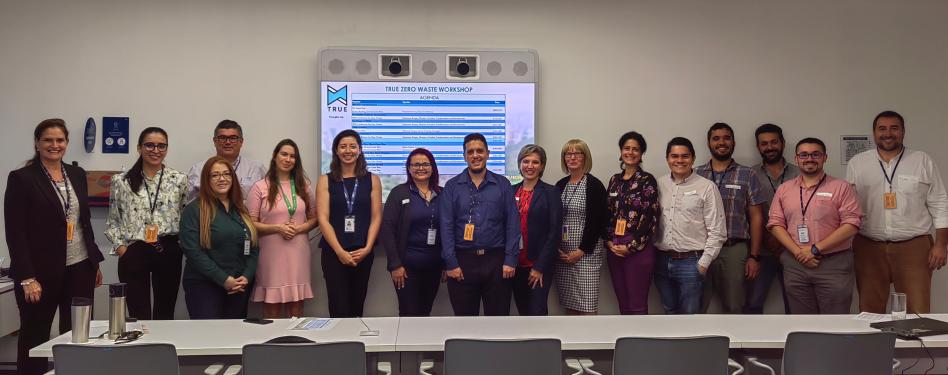
Feature image courtesy of Green Building Council Costa Rica.
In 2022, Latin America’s governments, nonprofits and companies are all looking toward the future. At TRUE, the future is zero waste—or in Spanish, "basura cero." This year, we have been able to collaborate with groups all over Latin America to plant the seeds of sustainability. The governments of Costa Rica and Chile have enacted groundbreaking producer responsibility policies.
USGBC and our Latin American Green Building Council (GBC) partners such as GBC Costa Rica (GBCCR), SUMe, and GBC Chile have put together a fantastic lineup of conferences this year, and in Mexico, Colgate-Palmolive and Taylor Farms have achieved the region’s first TRUE Platinum certifications.
Zero waste progress in Costa Rica
Costa Rica is a global pioneer in green legislation. Their government has taken an aggressive approach to preserving their natural landscapes. Notable legislation includes their ban of polystyrene (colloquially know as Styrofoam) and their zero waste to landfill initiative. Costa Rica is also in the process of phasing out all single-use plastics. Much of the legislation that has come out of Costa Rica’s pledge to go zero waste took effect in 2021, and we anticipate seeing the effectiveness and implementation strategies that come out of this initiative in the coming years.
Zero waste progress in Chile
Chile is also strengthening its sustainability commitments by enacting Law Nº 20.920. The intent of this legislation is to bolster extended producer responsibility in Chile. Extended producer responsibility refers to a materials management strategy where multiple entities share responsibility for the recycling and safe disposal of the materials they introduce into the product chain.
By placing special emphasis on a select set of materials, including batteries, tires, wrapping and packaging, Chile intends for companies to take responsibility for any nonrecyclable materials they bring into the country. A multifaceted framework of legislation and infrastructure is needed to see the most effective implementation of this law. Waste management systems will need to be thoroughly fleshed out, both on the individual level and on the collective level.
Using TRUE to further the circular economy
To keep this momentum rolling, many GBCs have partnered with TRUE to host workshops and promote circular economy education and opportunities. Gabriela Sabadini of GBC Chile reported that the TRUE workshop she hosted in July presented professionals not only from Chile, but also from Ecuador, Peru and El Salvador. In October, GBC Chile will be hosting the International Summit: Construye Sostenible.
GBCI Mexico's partnership with Mexico’s green building council, SUMe, has led to exciting progress for both green building and zero waste in the region. In June, SUMe hosted a circular economy session for hundreds of attendees, who are now laying the groundwork for a zero waste future.
In Costa Rica, the 9th International Congress of Sustainable Cities featured Stephanie Barger, TRUE’s director of market transformation and development, Zero Waste Costa Rica and Citi. According to Elena Mateo and Annemarie Sauter, directors of Zero Waste Costa Rica, “Building strategic alliances amongst the different sectors of society and promoting educational outreach programs are key factors in achieving a zero waste culture."

GBCCR, Zero Waste Costa Rica, Citi and TRUE hosted a zero waste workshop in Costa Rica. Photo courtesy of GBCCR.
Image courtesy of Green Building Council Costa Rica.
Another facet of growth we have seen in the past year is the TRUE certification of Colgate-Palmolive and Taylor Farm’s supply chain in Mexico. Colgate-Palmolive has more than 30 facilities around the globe certified with TRUE, found in Brazil, Ecuador and Chile, along with seven facilities in Mexico. There, its Mission Hills facility is certified at the Platinum level, the highest level of certification TRUE facilities can earn.
In June, Taylor Farms also certified a 125,000-square-foot facility in Mexico at the Platinum level by earning 64 TRUE credits.
Independent projects are also in the process of certification, such as Club Campestre, a 161,458-square-foot golf and sports club in Mexico City, which achieved precertification last December.
With many more projects currently in the works, TRUE is honored to support sustainability efforts across Latin America. “The countries of Latin America have so many great qualities for TRUE to celebrate and uplift,” noted Barger. “It’s exciting to be a part of their flourishing zero waste work and community.”
Available Spanish resources
Access Spanish articles and green building and business news on GBCI Mexico’s articles page. Their article on green building trends in Latin America highlights Brazil, Mexico and Colombia as the three countries with the most projected growth in their sustainable construction industries, with growth across the region in general increasing from 21% to 41%. Learn more about zero waste in construction.
TRUE is a quickly growing, international program found in 32 countries, and as our reach expands, so do our resources. As we work to encourage, educate and include more people on their journeys to zero waste, keep an eye out for Spanish rating system materials available this fall.